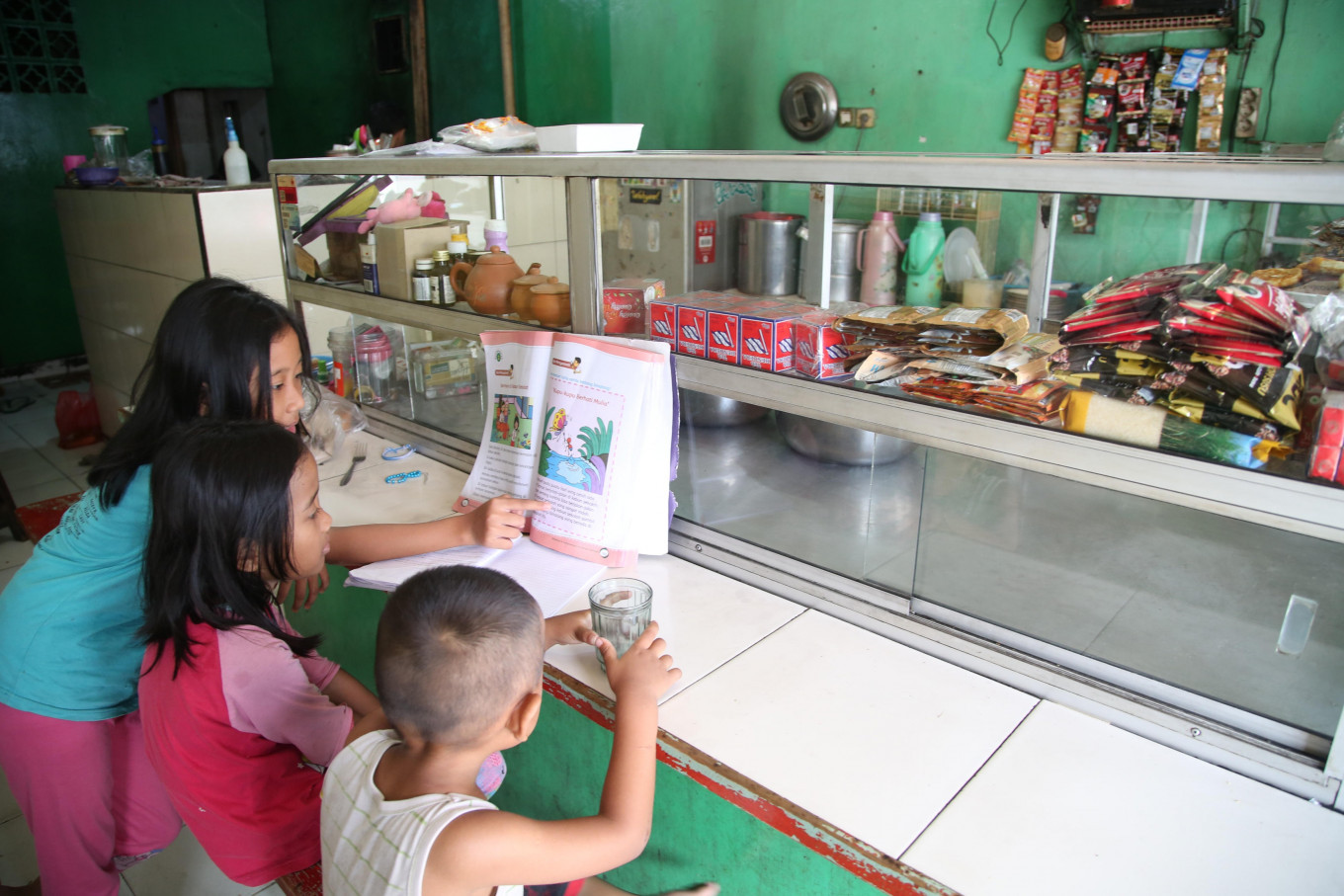Popular Reads
Top Results
Can't find what you're looking for?
View all search resultsPopular Reads
Top Results
Can't find what you're looking for?
View all search resultsCOVID-19: Children must keep learning despite crisis
As many parts of the country have become quiet under “large-scale social restrictions”, this is the best time for us to rethink our education system to ensure children can continue learning during these difficult times and that all children, regardless of status, have equal access to quality education.
Change text size
Gift Premium Articles
to Anyone
 Fifth-grader Mesa (left) helps her younger sister Shafa (center) study for school at their parents' food stall in Pinang Ranti, East Jakarta, on April 3, while their 4-year-old brother Eland looks on. The spread of COVID-19 has forced millions of Indonesians to work and study from home. (JP/P.J.Leo)
Fifth-grader Mesa (left) helps her younger sister Shafa (center) study for school at their parents' food stall in Pinang Ranti, East Jakarta, on April 3, while their 4-year-old brother Eland looks on. The spread of COVID-19 has forced millions of Indonesians to work and study from home. (JP/P.J.Leo)
A
van Fathurrahman, a teacher at an elementary school in Sumenep regency on Madura Island, East Java, was deeply concerned when his school was closed and teaching had to be carried out using the distance learning method. Almost all his students do not have cellphones, computers or televisions. He then took the initiative to visit his students’ houses one by one, a journey of 22 kilometers through challenging routes that he undergoes at least three times a week. During his visits, he teaches one-on-one, helps with homework and reviews previous homework. He wrote on his Facebook account that he realized he cannot obey the government’s suggestion of working from home and he fears getting infected with COVID-19, but he cannot leave his students unassisted. Avan’s struggles in this pandemic have gone viral and gained attention from the deputy regent and local and national lawmakers who have sent donations to help his efforts.
In contrast, other parents have reported a lack of assistance for their children during the current school closures, more so for children with special needs. In a webinar on April 19, held by the Women’s Empowerment and Child Protection Ministry, a parent of an autistic child said she was clueless about how to support her child’s studies. The teacher only gives out homework without providing adequate learning tools or materials. Other parents have complained that the learning materials from schools are hard to understand for children with disabilities.
National Education Day on May 2 this year is being marked while the country and the world are in the throes of an unprecedented pandemic. Almost 1.3 billion students globally and more than 68 million students in Indonesia, from the pre-primary to tertiary levels, have been affected by the school closures. Among them are vulnerable or marginalized children living in rural areas and remote locations, children with disabilities, those without access to technology and girls who face persistent challenges just to go to school, let alone the challenges they face in finishing their education.
As many parts of the country have become quiet under “large-scale social restrictions”, this is the best time for us to rethink our education system to ensure children can continue learning during these difficult times and that all children, regardless of status, have equal access to quality education.
The aforementioned experiences highlight challenges in ensuring equal access to quality education during this crisis. First, the online method does not reach children without access to internet, computers, cellphones and television. Rapid assessment of schooling during the pandemic by the Indonesia-Australia partnership education program called Innovation for Indonesia’s School Children (INOVASI) indicates that two-thirds of 221 participating teachers believe their students’ homes cannot support online learning.
Save the Children Indonesia’s rapid needs assessment found instant messages are the most preferred media by teachers to share learning materials (81.6 percent of around 4,700 teacher respondents) compared to online applications or websites. Almost 60 percent of around 12,000 parent respondents said their children receive assignments from WhatsApp.
From the key informants’ interview, we found that the cost to purchase internet data packages is the main reason why parents and teachers do not use online education platforms, followed by poor connection quality. Meanwhile, only around 40 percent of parents reported their children watch the government-run TVRI learning program, and there are also complaints about poor connection or inability to access TVRI.
Second, there has been lack of support, including learning materials, for children with disabilities. The 2018 household survey (Susenas) by Statistics Indonesia (BPS) indicates that, in normal times, close to 3 in 10 children with disabilities have never attended school.
In the INOVASI Program’s rapid assessment, 58 percent of 221 teacher respondents do not implement any specific learning measures for children with disabilities. That means a wide range of children with disabilities are presently without access to relatively good quality education, or are even without any education.
Teachers like Avan in Madura must get assistance and support to continue teaching in a way that does not further burden their financial and personal situation. We recommend the Education and Culture Ministry to continue developing and publishing learn-from-home guidelines for local education agencies, schools, teachers, parents and students that follow international standards. Those standards are beneficial to ensure schools operate safely, adapt school policies and establish new school procedures, monitor attendance, support specific marginalized groups, explore lists of resources for no-tech or low-tech learning, run teacher peer-coaching and support parents as teaching partners, and prevent violence that may occur in the context of COVID-19.
Citizens can monitor implementation of the ministerial regulations on the school operational assistance (BOS), which now can be used for teachers’ pay, transportation expenses, as well as data packages and hygiene equipment for schools.
The government must make sure children and teachers without access to online technology can still learn with alternative offline or non-digital methods effectively. Equipment such as textbooks and printing and data services must always be available and distributed for students. Schools for children with special needs and other public schools that implement inclusive education should use the available budget scheme for accessible learning materials, teaching assistance for parents and learning methods for children with disabilities. Parents, teachers, children themselves and the community can do their part by monitoring the use of this budget in their area.
Save the Children has been working with the national and local governments in implementing education in emergency programs. Our activities include assisting development and dissemination of guidelines on learning during the COVID-19 pandemic; promoting Education in Emergency principles and practical tips through online platforms; training/workshops for teachers and distributing learning materials or equipments.
To ensure children’s safety while learning, we also aim to strengthen child safeguarding systems in communities to prevent and quickly handle domestic, physical, sexual and online violence. Every child must enjoy their right to education even in emergencies. We will not come out and thrive from this crisis if there are still children who are not learning.
***
Priliantina Bebasari is policy advocacy specialist and Marni Silalahi is education in emergency advisor, both at Save the Children Indonesia









